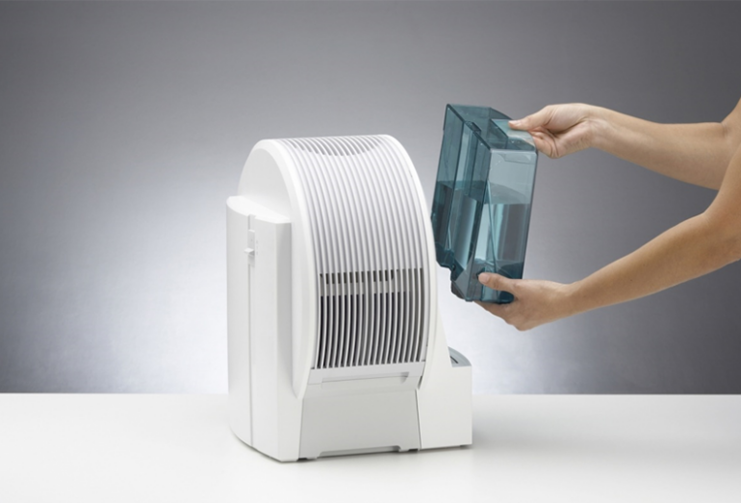We are increasingly using devices that allow us to take care of our indoor air quality and microclimate. These include easy-to-use air purifiers that help avoid, among other things, the negative impact of allergens on our health.
An air purifier is an effective way to improve breathing comfort in living spaces and at work. There are various types of devices on the market, which differ not only in price but also in performance and the technological solutions used. How does an air purifier affect our health? Is it a good choice for allergy sufferers? We explain.
How Do Air Pollutants Affect Health?

There are various pollutants in the air. Dust, pollen, house dust mites, volatile organic compounds, harmful gases, particulate matter, and tobacco smoke, all of which negatively affect our health, leading to the development of inhalation allergies, among other things.
Studies show that indoor air can be up to 3 times more polluted than outdoor air. This has to do, among other things, with the penetration of harmful smog, which accumulates in large quantities in a small space.
We often “produce” harmful chemicals ourselves when we use deodorants, air fresheners, and some scented candles, and buy furniture and finishing materials without proper approvals.
Our immediate environment also produces unpleasant odors and water vapor, which, in the absence of proper ventilation, causes mold and mildew on walls, among other things. We should also not forget the harmful effects on the health of positive ions, which are generated by the use of electronic devices, reducing breathing comfort and affecting the deterioration of our health.
The air pollutants we encounter in our homes or apartment, as well as in the workplace, can lead to serious health problems. One of them is an inhalant allergy, which can develop at any stage of life.
Allergy symptoms are caused by, among other things, grass pollen and other plant pollens entering the living space, but just as often a troublesome runny nose, sneezing, and coughing are triggered by other inhalant allergens, such as mold spores, dust, animal dander and chemicals from detergents.
Chemical compounds that are released from the paints and furnishings used indoors are also a serious problem. If you have allergies, we need to take special care of the quality of the air you breathe, but you also need to consider the risks, which apply not only to allergy sufferers.
Breathing polluted air, we can quickly experience a significant decrease in performance and notice that we develop headaches, drowsiness, discouragement, and problems with memory and attention. Self-feeling is further aggravated by excessive humidity and dry air, as well as the state of the air in the place, which is caused by the lack of adequate ventilation and frequent airing of the premises.
All of the above health risks and bothersome symptoms can effectively reduce by using a properly selected air purifier. Devices for mechanical filtration of indoor air are available in many types, which makes it easy for us to choose an air purifier perfectly suited to our individual needs.
More information about air purifiers can be found here – https://myintelligenthouse.com/blue-air-purifier-red-light/
How Does an Air Purifier Work?
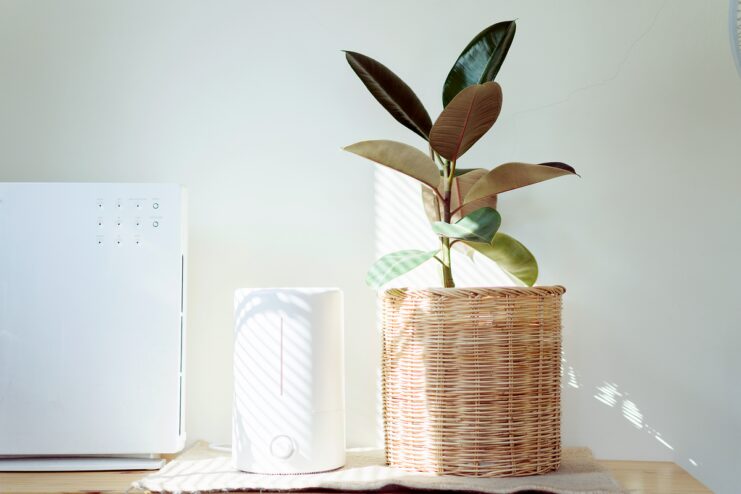
Although the number of available technological solutions can make it a bit difficult to choose an air purifier, it is worth knowing that most devices of this type, work on a similar principle. When plugged in, they suck in air, which passes through successive filters and is stripped of harmful pollutants.
As a result, we can breathe clean air that does not adversely affect our health and enjoy high breathing comfort and well-being. The concentration of dangerous pollutants in the air thanks to the work of a high-efficiency purifier can be reduced by up to 99.9%.
However, filtration devices differ in their air purification efficiency, which is a key criterion for their selection. An efficient purifier is a purifier that can filter all the air that is in the room three times during an hour’s operation. The efficiency of purification is selected in terms of the square footage of the room in which it is to take care of the maintenance of air quality.
Simple air purifiers only remove pollutants, but there are also devices on the market with additional functions that allow you to comprehensively take care of maintaining the right microclimate in the premises. This solution is ideal when the air in the building is too dry or characterized by increased humidity, as well as when we want to remove excess positive ions from our environment.
Types of air purifiers
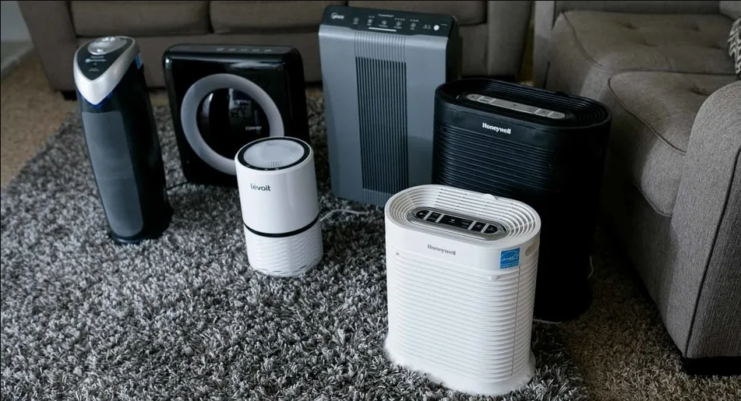
As already mentioned, there are several types of air purifiers, and each of them can be tailored in terms of functionality and air purification performance to individual needs.
They differ in the type of filtration, the level of noise generated, the ability to remotely control or program the operation of the device, the use of various sensors, design, and size, among other things. The choice of a suitable air purifier should be preceded by a consideration of what our needs and expectations are, which will avoid unnecessary expenses.
We can divide air purifiers into:
- air purifiers for apartments,
- air purifiers for the home,
- air purifiers for business,
- air purifiers for allergy sufferers.
It is worth knowing that not every air purifier is characterized by the same efficiency in removing allergens, so if you have allergies, you should choose devices specifically designed for allergy sufferers.
An air purifier for an allergic person is characterized not only by increased efficiency, but also by the use of modern and effective filtration systems, which include a carbon filter, a HEPA filter, a pre-filter, and additional filters and functions that allow you to take care of ideal air purity and the right microclimate in the rooms.
The basis of filtration in most air purifiers is the carbon filter, which reduces bacteria, viruses, chemicals, and unpleasant odors, among other things. To stop allergens, the most common is the HEPA filter, which we know very well, among other things, through the use of modern vacuum cleaners.
The HEPA filter traps dirt particles and microorganisms that cause allergies, effectively dealing with house dust mites, for example. Equally often, air filtration devices are equipped with a pre-filter. This type of filter traps larger contaminants, such as pet hair.
During the operation of the device, the air passes through appropriately selected carbon filters, HEPA filters, and other filtration systems, which serve to reduce specific pollutants, such as larger dust particles, hair and dander, volatile chemicals, allergens and compounds present in smog, which include, among others: particulate matter PM 2.5 and PM 10.
What Air Purifier Will Be Good for An Allergic Person?
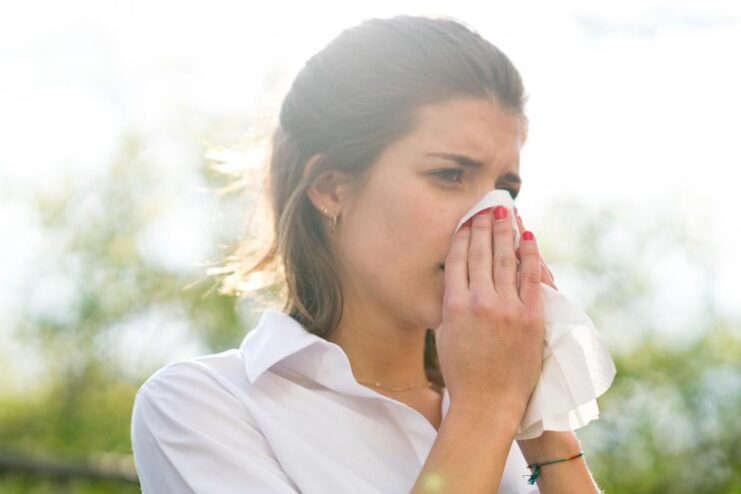
What kind of air purifier to choose for an allergic person? Allergic reactions are not only very inconvenient but also pose a health risk. Inhalation allergy can develop into bronchial asthma, so when choosing an air purifier for allergy sufferers, we should pay special attention to the technological solutions used and the features that will reduce the negative impact of allergens on health.
Particularly important are the safeguards that will make the device work in favor of our health, such as a pollution indicator, filter wear indicator, air condition monitoring sensor, pollution sensors, and automatic mode, which makes it easier to operate the purifier.
A good air purifier for an allergic person should be equipped with a set of HEPA and other filters that effectively reduce air pollutants, as well as allow to maintain of a friendly microclimate in the room.
It is worth paying attention to the noise generated by the device, as well as the night mode, which allows you to fall asleep peacefully and enjoy a restorative sleep when the air purifier is running in the room.
Equally important is the efficiency of humidifying and dehumidifying the air, as well as its effective ionization. The device should reduce not only allergens but also harmful gases and other pollutants that enter the building from the outside, such as car exhaust compounds and smog.
How to Use the Purifier Properly?
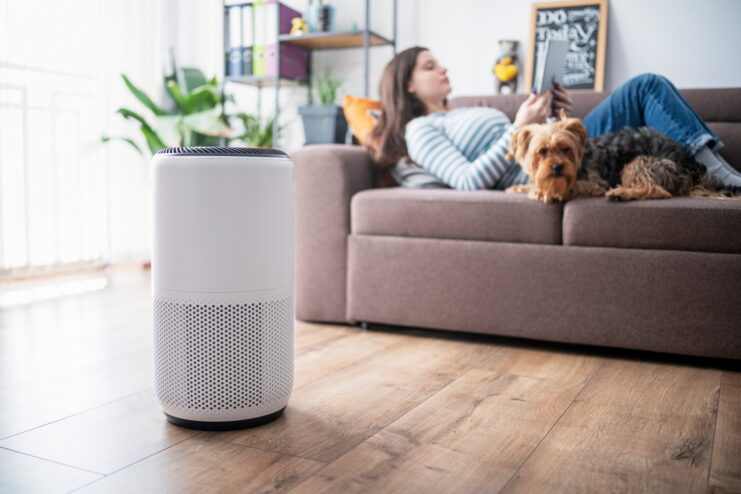
The high quality and efficiency of an air purifier will not ensure that we can breathe clean air if we do not use the device in the right way. The efficiency of the air purifier is affected, among other things, by where it is placed. The location of the purifier in the room should allow air to flow freely, so do not place the device, for example, close to a wall, furniture, etc.
We must systematically take care of the filter device, replace used filters, and monitor the cleanliness of the water tank, which is part of air purifiers with humidification and moisture absorption functions.
This is very important because the water remaining in the tank can become a breeding ground for microorganisms, which will be blown into the room during the operation of the device.
It is important to remember that the cleanliness of the filters determines the effectiveness of removing allergens and other pollutants from the air, so they can not be used indefinitely. By choosing a device with a filter wear indicator, we can easily check whether the consumables need to be replaced.
Use of the air purifier should be in accordance with the recommendations of its manufacturer because only then we can take care of clean air and enjoy comfortable breathing.
Does a Good Air Purifier Have to Be Expensive?
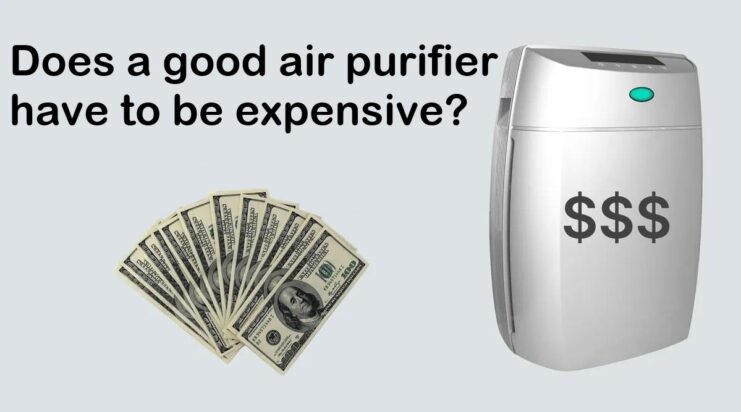
A good air purifier is an investment for many years. It is worth considering whether it pays off for us to buy an air filtration device that will be suitable for replacement after a few months of intensive use. The same goes for buying several devices, i.e. a humidifier, a moisture absorber, and an air ionizer, because by choosing a multifunctional device, we can save a lot.
There are high-quality and affordable air purifiers on the market, which are perfect for rooms where allergy sufferers live.
In order not to expose yourself to unnecessary expenses and avoid problems, it is worth checking the prices and availability of consumables before buying a purifier, because in the case of some devices, they are very high, significantly increasing the costs associated with the operation of the device.
Buying an Air Purifier in A Nutshell
To avoid overpaying and wasting your hard-earned money, we should choose an air purifier by paying attention to several important criteria, which include:
- filtration performance, humidification, moisture absorption, and ionization functions,
- energy consumption,
- price and availability of consumables,
- available modes of operation of the device,
- the use of sensors and safety features that facilitate the use of the purifier,
- intelligent functions and the ability to remotely control the operation of the device,
- the level of noise generated.
A good air purifier should be equipped with a pre-filter that traps larger air pollutants, a carbon filter that reduces viruses, bacteria, fungi, and chemical compounds, and a HEPA filter that effectively reduces allergens and other microscopic pollutants.
Also important is the appearance of the device, which should harmonize with the interior design and be its decoration. The dimensions of the device should be matched to the square footage of the room; the same applies to the performance of the air purifier.
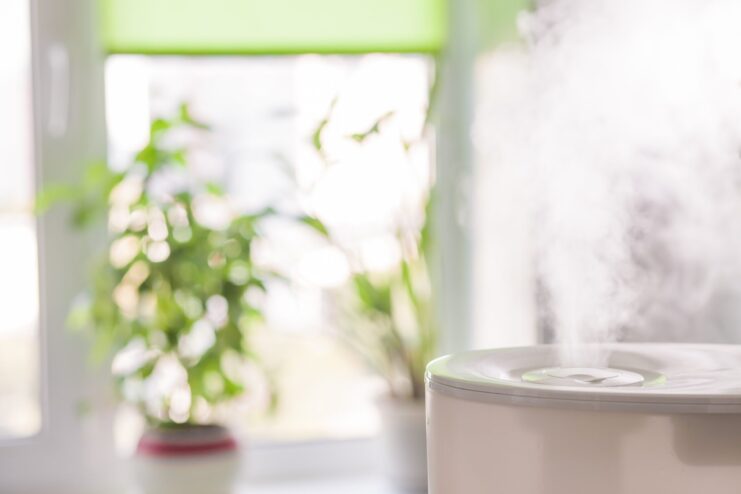
The purchase of an air purifier should include the selection of a device whose efficiency allows it to filter the air at least three times during its hour of operation. This will allow us to breathe clean air that will not negatively affect the health of allergy sufferers.
When looking for an air purifier for a child’s room, it is worth checking whether the device is equipped with a lock function, so that the child will not be able to turn the device on and off by himself, as well as to change the parameters of its operation.
Summary
Choosing an air purifier for an allergic person is very difficult, but there are air filtration devices on the market that can be tailored to individual needs. The purchase of an air purifier must take into account the selection of a device that not only has adequate performance and functionality but also meets the applicable quality standards.
They are quite strict, which allows you to be sure that the investment in an air purifier will not be an unnecessary expense.

